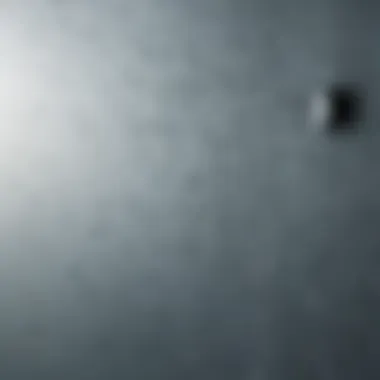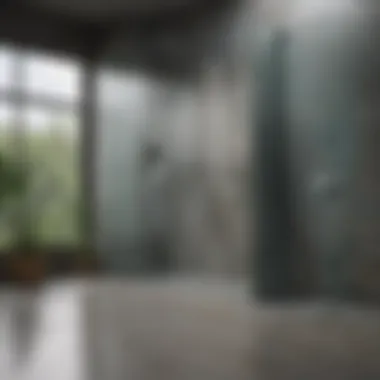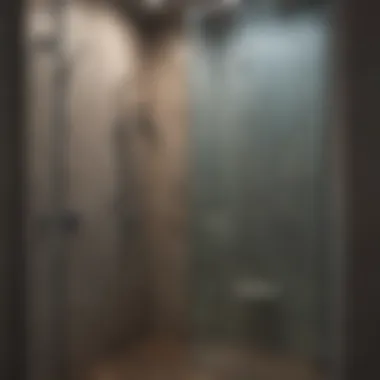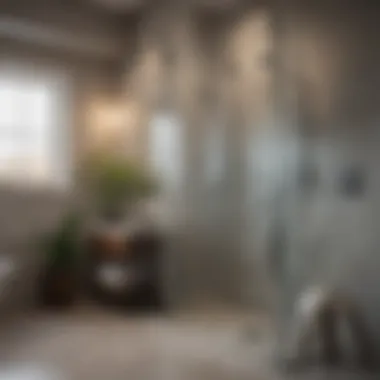Effective Techniques for Removing Hard Water Spots


Intro
Hard water spots on shower glass can be a frustrating problem for many homeowners. These spots arise due to the minerals present in hard water, such as calcium and magnesium. Over time, these minerals build up on surfaces, creating a dull and often unsightly appearance. Understanding how these spots form is crucial for developing effective removal techniques.
This article aims to provide practical methods for eliminating hard water spots from shower glass. It will examine both commercial and homemade cleaning solutions, along with their environmental impacts. We will also explore preventive strategies to keep glass surfaces clear for extended periods. With this knowledge, homeowners can better maintain their shower spaces and enhance the overall aesthetic of their bathrooms.
Understanding Hard Water Spots
Hard water spots are a common concern for homeowners, especially in areas with high mineral content in the water supply. These unsightly blemishes can form on shower glass, creating an unappealing, hazy appearance. Understanding what hard water spots are, their formation process, and the reasons they occur is essential. This knowledge lays the groundwork for effective cleaning techniques and preventative measures.
What Are Hard Water Spots?
Hard water spots are mineral deposits left behind when water evaporates. Water naturally contains minerals like calcium and magnesium. When droplets of water land on the glass surface and evaporate, they leave these minerals behind. Over time, these deposits accumulate and can become stubborn stains. Hard water spots differ from regular soap scum because they are specifically caused by mineral buildup rather than the remnants of soap or body products. Homeowners often find these deposits not only frustrating but also challenging to remove without the right techniques.
Causes of Hard Water Deposits
The primary cause of hard water deposits is water that has a high mineral concentration. Several factors contribute to the prevalence of hard water:
- Geographic location: Areas with limestone or chalk in the groundwater are more likely to have hard water.
- Plumbing materials: Certain pipes, especially older ones, can leach minerals into the water.
- Usage patterns: Frequent showers can increase mineral buildup on glass surfaces, particularly when water is allowed to dry without wiping.
Understanding these causes can help in tailoring cleaning methods and adopting practices that minimize the occurrence of hard water spots, thereby making the challenge less overwhelming for homeowners.
The Impact of Hard Water on Shower Glass
Understanding the impact of hard water on shower glass is crucial for homeowners. Hard water spots do not just affect the appearance of your shower; they can also lead to significant long-term concerns. The presence of mineral deposits can accumulate over time, creating a barrier that obstructs the transparency of the glass. This accumulation necessitates frequent cleaning, which can prove time-consuming and frustrating.
Aesthetic Concerns
The aesthetic concern associated with hard water spots on shower glass is one of the most immediate implications. Shower glass often serves as a focal point in a bathroom, contributing to its overall ambiance. When hard water is present, glass surfaces tend to develop a cloudy or streaky appearance. This not only diminishes the clarity of the glass but also reflects poorly on the overall cleanliness of the bathroom.
Homeowners often find that despite regular cleaning, the spots remain persistent. Ignoring these aesthetic issues may lead guests to perceive a lack of hygiene or maintenance within the home. Fortunately, acknowledging this concern is the first step towards implementing effective cleaning solutions.
Long-Term Damage to Glass
Besides the aesthetic appeal, hard water can cause long-term damage to shower glass. The minerals found in hard water, such as calcium and magnesium, can lead to etching. Etching occurs when these minerals react with the glass surface, making it rougher and less smooth. Over time, this can become irreversible, resulting in a permanent cloudiness or discoloration of the glass.
Furthermore, as surface etching develops, it can trap dirt and soap scum more easily, making cleaning efforts increasingly ineffective. This cyclical problem exacerbates frustration for homeowners who strive to maintain a pristine bathroom. Regularly addressing hard water issues is essential not just for aesthetic reasons but also for preserving the integrity and longevity of shower glass.
By taking these factors into account, homeowners can better appreciate the importance of addressing hard water spots promptly. Preventative measures and effective cleaning techniques can go a long way in maintaining both the appearance and functionality of shower glass surfaces.
Traditional Cleaning Methods
Hard water spots are a common nuisance for homeowners. Traditional cleaning methods provide a practical approach for removal. Understanding these methods helps to arm one with the necessary tools for maintaining the clarity of shower glass over time. Using household items not only makes these cleaning methods accessible but also budget-friendly. Moreover, traditional cleaners often reduce the need for harsher chemicals, thus contributing to a safer home environment.
Using Vinegar Solutions


Vinegar is a widely recognized cleaning agent effective for removing hard water spots. Its acetic acid composition works to dissolve mineral deposits typically left by hard water. Using vinegar often involves simple steps. Diluting vinegar with water in equal parts creates an effective solution. One can spray this mixture onto the glass and let it sit for several minutes. This waiting time allows the vinegar to penetrate deep into the stubborn spots.
After it sits, use a soft cloth or sponge to wipe the glass. Circular motions may assist in lifting the residue without scratching. For challenging spots, applying pure vinegar can be a suitable option. Rinsing the glass with warm water post-cleaning is crucial. It removes any vinegar scent while ensuring no residue is left behind.
Tip: Always do a small test in an inconspicuous area to ensure the vinegar does not affect the glass or any surrounding surfaces.
Baking Soda Paste Application
Baking soda is another powerful ally in the fight against hard water spots. This substance is mildly abrasive, which allows it to scrub away deposits without causing damage to the glass surface. Making a baking soda paste is quite simple. Combine four tablespoons of baking soda with two tablespoons of water. This ratio yields a thick paste that clings well to glass.
To apply, spread the paste onto the spots and let it sit for about 15 minutes. This duration allows the baking soda to interact with the mineral deposits effectively. Afterward, use a damp cloth or soft sponge to scrub the area gently. The combination of baking soda's abrasiveness and the gentle scrubbing motion usually yields good results. Following the scrubbing, rinse the affected glass areas using warm water to remove the paste.
Using both vinegar and baking soda can be an effective way to complement each method. One can apply vinegar first and follow up with the baking soda paste. This dual approach can dramatically increase cleaning efficacy.
"Effective cleaning methods with simple ingredients can save time and frustration in maintaining shower glass surfaces."
In summary, employing traditional cleaning methods such as vinegar solutions and baking soda paste offers effective strategies for dealing with hard water spots. They are not only efficient but also environmentally friendly, making them ideal choices for conscientious homeowners.
Commercial Cleaning Products
Commercial cleaning products play a vital role in the battle against hard water spots on shower glass. They are specifically formulated to tackle mineral deposits left by hard water, and their effectiveness often surpasses homemade solutions. These products simplify the cleaning process, making it easier and less labor-intensive for homeowners. Moreover, the convenience of having a ready-made solution can save time, especially for those with hectic schedules.
Evaluating Effectiveness
When considering commercial cleaners, effectiveness should be the primary factor. Different products work in unique ways. Some utilize powerful acids to dissolve mineral buildups, while others may incorporate surfactants for enhanced dirt and grime removal. A few popular products include CLR Calcium, Lime, and Rust Remover or Rain-X Shower Door Cleaner.
Before committing to a product, it is prudent to evaluate its performance through the following methods:
- User Reviews: Read reviews on retail websites and forums, such as Reddit or specialized cleaning communities on Facebook, to gauge real-world effectiveness.
- Trial and Error: Consider purchasing smaller-sized bottles first to test various brands and assess how well each works on your shower glass.
- Label Instructions: Thoroughly review the usage instructions on the label to ensure it can be safely applied on glass without causing damage or etching.
"Choosing the right commercial cleaner can save you both time and effort, leading to cleaner glass surfaces with minimal scrubbing."
Safety Considerations
Safety is paramount when using commercial cleaning products. Many available solutions contain harsh chemicals that can pose risks to both humans and the environment. It is essential to be aware of the following safety aspects:
- Ventilation: Always use commercial cleaners in well-ventilated areas. Ensure that the bathroom door or window is open to disperse fumes effectively.
- Protective Gear: Wear gloves and possibly safety goggles to prevent chemical burns and irritation from splashes.
- Kids and Pets: Keep all cleaning products out of reach from children and pets, as ingestion or skin contact can be hazardous.
- Compatibility: Ensure the products are suitable for your specific glass type. Some cleaners could scratch or damage delicate glass finishes.
By prioritizing safety, homeowners can effectively and confidently use commercial cleaning products to maintain clear and spot-free shower glass.
Tools and Techniques for Effective Cleaning
Cleaning hard water spots from shower glass is both a task and an art. The effectiveness of the cleaning process largely depends on the tools used and the techniques employed. Proper tools create a significant difference in achieving satisfying results. When equipped with the right materials, homeowners can ensure the removal of stubborn spots without damaging the glass surface.
The goal is not just to clean but to maintain the clarity and integrity of the glass over time. Using appropriate cleaning techniques will save both time and effort. Focus on the specific elements and benefits of the tools and methods will lead to effective cleaning and lasting results.


Selecting the Right Tools
Choosing the proper tools is crucial in the fight against hard water stains. Here are some essential tools to consider:
- Microfiber Cloths: Soft, non-abrasive, and effective in trapping dirt and grime. They are perfect for a gentle wipe-down of glass surfaces without scratching.
- Squeegee: This tool helps remove water after each shower, preventing spots from forming.
- Scrubbing Sponges: Use sponges that won’t scratch the glass but have enough texture to tackle tough stains.
- Vinegar Spray Bottle: An easy-to-use container for homemade vinegar solutions. The acidity in vinegar helps dissolve minerals in hard water.
- Baking Soda: Known for its abrasive qualities. It works well when mixed into a paste with water for heavier scrubbing tasks.
It’s essential to avoid tools that may cause scratches or damage. Plastic scrubbing pads and harsh chemicals can do more harm than good.
Step-by-Step Cleaning Process
To effectively remove hard water spots, follow this structured, step-by-step process:
- Preparation: Start by gathering all necessary tools and cleaning solutions. Ensure the workspace is safe and dry to avoid slipping.
- Initial Rinse: Use warm water to rinse the glass surface. This helps in softening the hard water deposits.
- Vinegar Application: Spray the vinegar solution evenly across the affected areas. Let it sit for about 5-10 minutes to penetrate the deposits.
- Scrubbing: With the microfiber cloth or sponge, gently scrub the surface in circular motions. Pay special attention to persistent stains.
- Baking Soda: If any stains remain, apply a baking soda paste. Rub it gently over the spots. The combination of vinegar and baking soda can effectively break down deposits.
- Final Rinse: Rinse the glass thoroughly with warm water. Ensure all residue from cleaning solutions is removed and the surface is clean.
- Drying: Use a squeegee to remove excess water. Follow with a clean microfiber cloth to achieve a streak-free finish.
Following this structured process consistently enhances the durability of the cleaning. Keeping a regular schedule will prevent the build-up of hard water stains, enhancing the aesthetic appeal of the shower glass.
This method, combined with the right tools, will ensure sparkling clean shower glass and prolong the clarity of the surface. Regular maintenance after cleaning will make future cleaning processes even simpler.
Preventative Measures
Preventative measures play a crucial role in managing hard water spots on shower glass. By taking proactive steps, homeowners can significantly reduce the accumulation of these unsightly deposits. Hard water is primarily composed of minerals such as calcium and magnesium, which leave residue behind when water evaporates. Thus, preventive strategies are essential not only for maintaining the aesthetic appeal of glass fixtures but also for extending their overall lifespan. In the pursuit of spotless shower glass, understanding and applying effective prevention techniques can yield substantial benefits.
Regular Maintenance Routines
Establishing a regular cleaning routine is one of the most effective ways to prevent hard water spots. By frequently cleaning shower glass surfaces, you can minimize the buildup of mineral deposits. Here are some tips to consider:
- Wipe Down After Use: After each shower, take a few moments to wipe down the glass with a squeegee or microfiber cloth. This simple action removes excess water and prevents minerals from settling.
- Daily Spray Solutions: Using a daily shower spray can inhibit mineral accumulation. These sprays are designed to create a barrier on the glass, making it less likely for hard water to leave spots.
- Establish a Weekly Cleaning Schedule: Commit to a more thorough cleaning session once a week. Use appropriate cleaners that target hard water stains and follow up with a rinse to ensure no residue is left behind.
- Focus on Shower Fixtures: Pay attention to showerheads and faucets as well. Mineral buildup on these fixtures can contribute to the hard water problem overall.
Installing Water Softeners
For a more long-term solution, homeowners might consider installing water softeners. These devices work by removing calcium and magnesium from the water supply. Here are key points to understand:
- How It Works: Water softeners use a process called ion exchange to replace hard minerals with sodium or potassium ions. This transforms hard water into soft water, effectively eliminating mineral deposits on surfaces, including glass.
- Benefits of Softened Water: Beyond preventing hard water spots, softened water provides additional advantages. It can enhance the efficiency of soaps and detergents, leading to cleaner bathrooms and less soap scum. Moreover, it may improve the lifespan of plumbing systems and appliances.
- Considerations for Installation: Before purchasing a water softener, assess your household's water usage. Determine the right capacity needed to manage the volume of water effectively. Consulting a professional may be beneficial for proper selection and installation.
Implementing these preventative measures can drastically reduce hard water spots and maintain the clarity of shower glass. These steps are practical and require minimal investment, ultimately saving time and effort in cleaning while preserving the integrity and appearance of the glass surfaces.
Environmental Considerations
Addressing hard water spots on shower glass involves not only effective cleaning methods but also a vital awareness of environmental impacts. Many traditional cleaning solutions contain harsh chemicals that can harm both your health and the environment. Thus, adopting eco-friendly practices enhances your efforts to maintain clean glass surfaces and promotes sustainability in home cleaning. Choosing environmentally conscious options can result in safer living conditions and contribute to the well-being of local ecosystems.
Eco-Friendly Cleaning Solutions
There are several natural and effective cleaning solutions that can help remove hard water stains without harming the environment. Common household items can serve as alternatives to chemical cleaners:
- White Vinegar: Its acidic nature easily tackles mineral deposits, dissolving hard water spots effectively.
- Baking Soda: When combined with vinegar, it creates a fizzy reaction that helps lift grime and stains.
- Lemon Juice: The citric acid present in lemon juice helps dissolve mineral build-up and leaves a fresh scent.


Using these eco-friendly alternatives not only ensures a healthier indoor environment but also reduces the impact on surrounding natural habitats.
Reducing Chemical Usage
Minimizing the use of chemicals in your cleaning routine offers significant benefits. It can lead to a reduction in allergic reactions, respiratory issues, and skin irritations that might arise from exposure to harsh substances. Here are some ways you can limit chemical usage while maintaining cleanliness:
- Dilute Store-Bought Cleaners: If you opt for commercial products, consider using them in a diluted form to decrease toxicity levels.
- Use Concentrated Formulas: Some brands offer concentrated formulations that require less product per use, thus reducing waste.
- Regular Cleaning Routines: Establishing a consistent cleaning schedule prevents the buildup of stains, making it easier to maintain surfaces without aggressive cleaners.
Reducing chemicals not only benefits personal health but also ensures cleaner waterways and less environmental pollution.
Expert Insights
The inclusion of expert insights in the discussion about removing hard water spots from shower glass is vital for several reasons. First, it brings authoritative knowledge to the forefront. Professionals possess firsthand experience with various cleaning methods and products, enabling them to offer reliable recommendations and share practical advice based on their observations.
Moreover, expert insights help bridge the gap between traditional techniques and modern solutions. With numerous products available, homeowners seeking to combat hard water spots can benefit from guidance that distinguishes between effective and ineffective strategies. This knowledge empowers them to make informed decisions, optimizing their cleaning routines while avoiding unnecessary waste of time and resources.
Importantly, professionals also emphasize safety considerations, urging users to balance effectiveness with environmental responsibility. By discussing both short-term and long-term implications associated with certain cleaning products, they provide a holistic view. This ensures that readers not only achieve clearer glass surfaces but also understand the impact of their cleaning choices on the wider environment. Ultimately, integrating expert advice enhances the overall quality of the article, equipping readers with the tools they need to address and manage hard water stains effectively.
Advice from Professional Cleaners
Professional cleaners recommend a variety of techniques to effectively deal with hard water stains on shower glass. One popular approach is the use of specialized glass cleaners designed specifically for mineral deposits. Many of these products contain ingredients that break down the deposits, making removal easier. When applying these products, it is crucial to follow the manufacturer's instructions to achieve the best results.
Additionally, cleaners often suggest regular maintenance as a proactive strategy to prevent hard water spots from developing. Here are some practical tips:
- Wipe down surfaces after each shower to minimize drying time for the water.
- Use a squeegee or microfiber cloth to remove excess water from the glass.
- Establish a cleaning schedule, ideally weekly or biweekly, to tackle any emerging stains before they become severe.
The use of non-abrasive tools is essential. Abrasive materials can scratch glass surfaces, leading to further complications. Many professionals advocate for using soft cloths or pads for cleaning tasks.
Recommendations for Homeowners
For homeowners, the challenge of maintaining clear shower glass can be daunting, but it is manageable with a few practical recommendations. First, implementing a routine cleaning schedule can significantly reduce the effort needed to combat hard water stains. Performing regular cleanings prevents build-up, making future maintenance simpler.
Consider these additional tips:
- Choose the right cleaning product based on the severity of the stains. For lighter spots, a simple vinegar solution might suffice, whereas tougher deposits may require stronger commercial cleaners.
- Test any product on a small, inconspicuous area first to ensure it does not damage the glass. Not all cleaning agents are suitable for all types of glass.
- Invest in a water softener system if hard water is a persistent issue in your home. This solution can significantly reduce mineral content in your water supply, leading to fewer stains.
By adopting these strategies, homeowners can maintain clear and attractive shower glass surfaces while minimizing the time and effort required for cleaning.
Finale
Addressing hard water spots on shower glass is essential for maintaining not just the aesthetic appeal of your bathroom, but also the longevity of your glass fixtures. This article emphasized the importance of understanding hard water and its effects, as well as practical methods for removal. Effective cleaning techniques and the use of both commercial products and eco-friendly solutions were discussed in detail, providing a range of options for homeowners to choose from.
Moreover, preventative measures such as regular maintenance routines and potential installations of water softeners can significantly reduce the incidence of hard water spots. By integrating these insights into daily cleaning habits, one can ensure their shower glass remains crystal clear for a longer duration.
Being informed about the methods and materials for removing hard water spots allows homeowners to make educated choices that align with their values and lifestyle. Employing the appropriate techniques not only ensures clarity in shower glass but also minimizes long-term damage, protecting your investment in home decor.
Recap of Key Points
- Hard water spots result from mineral deposits left on glass surfaces.
- Aesthetic and functional concerns arise from untreated deposits.
- High-efficacy methods include vinegar solutions and commercial cleaners.
- Routine maintenance is crucial to prevent buildup.
- Eco-friendly solutions offer a sustainable alternative to harsh chemicals.
Final Thoughts on Maintaining Shower Glass
Maintaining shower glass requires attention beyond mere surface cleaning. Incorporating routine checks and learned cleaning methods can elevate the cleanliness and appearance of your bathroom. Ensuring that water is well-managed and utilizing the right tools make all the difference in achieving the desired clarity. With the knowledge acquired from this article, you can apply practical techniques to prevent and effectively address hard water spots, leading to a more pleasant and visually appealing bathing space.















